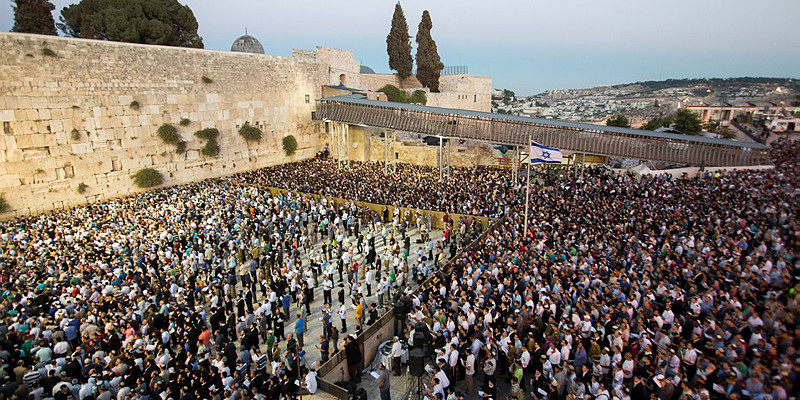This week’s Torah portion is read before Tisha b’Av, the date on which the First and Second Temples in Jerusalem were destroyed, among other tragedies that befell the Jewish People. With true unity, however, we can bring about the ultimate redemption.
This week’s Torah portion is Devarim (Deuteronomy 1:1-3:22), which is the opening reading of the Book of Deuteronomy. As is with much of the book of Deuteronomy, the portion of Devarim is essentially Moses’ final sermon before he dies. It is an oral “Last Will and Testament” spiced with words of rebuke in order for the Jews to better themselves for entering the Land of Israel.
One of the things Moses says is:
“…I cannot carry you alone. Hashem your G-d caused you to multiply, and today you are like the stars of the Heaven in multitude… how can I alone carry your toil, your burden and your argument?”
The commentators wonder at this somewhat unclear passage. What is Moses saying exactly? What is the “toil, burden, and argument” to which Moses is referring?
Some suggest that the “toil” was the constant effort Moses made to teach the people the Torah, and the “burden” was all the praying the Moses frequently found himself doing on behalf of the Jewish people. Indeed, we are taught that Moses took upon himself the responsibility to pray for the needs of each and every individual Jew. Whether it was a domestic issue, a health issue, or a child raising issue – Moses was the address to go to, and he would pray on one’s behalf. Finally, the “argument” is said to refer to Moses’ role in resolving civil, financial, and monetary disputes among people.
The Definition of a Great Leader
What we see here is the definition of a great leader. How many leaders today take a personal interest in every one of their followers? How many educators will repeat their lesson 100 times to ensure that every one of their students understands it? How many leaders take the time to address the problems among their followers? In other words “toil, burden, and argument” represent attributes that every leader should cultivate.
This week’s Torah portion is also one of the places where the Torah compares the Jews to “the sand of the sea and the stars of Heaven.” Why are the Jews frequently compared to the sand and the stars?
One of the many interpretations is that sand represents unity, while stars represent split, estrangement and disarray. Grains of sand are compacted together, while stars are distant from one another. Grains of sand can be gathered together, two stars cannot be brought together. When the Jews are united, they are like sand. When they find themselves fighting and polarized, they are like the stars.
Saddest Day on the Jewish Calendar
We find ourselves at the saddest time on the Jewish calendar. Tisha B’av, the ninth day of the Hebrew month of Av, is a day of mourning and fasting. There is a long list of tragedies that occurred on Tisha B’av, one of them being the destruction of the Beit Hamikdash, the Holy Temple. One of the reasons that the Temple was destroyed was due to Sinat Chinam – baseless hatred. The Jews were divided and separate – they were like the “stars.” Our sages teach us that the way to rebuild the Temple and usher in the Messianic era is to be like “sand” – UNITED and living together in harmony.
The first word of the verse quoted above is “Eicha” in the Hebrew original. Eicha is also the Hebrew name for the Book of Lamentations that is recited on Tisha B’av. Could it be that Moses foresaw that one day the Jews would be living like “stars”– which would lead to the destruction of the Temple, and by extension, the observance of Tisha B’av and the “need” for the Book of Lamentations? Who knows. But perhaps if the Jewish people relate to each other more like the “sand,” we will soon experience the ultimate redemption and the rebuilding of the Holy Temple. May this happen speedily in our days!
By Rabbi Ari Enkin, Rabbinic Director, United with Israel
For more insights by Rabbi Enkin on this week’s Torah portion, click on the links below.
https://unitedwithisrael.org/living-torah-bribery-vs-gratitude/
https://unitedwithisrael.org/some-mistakes-could-become-valuable-life-lessons/
https://unitedwithisrael.org/the-greatness-of-you/
https://unitedwithisrael.org/living-torah-a-nation-of-leaders/
